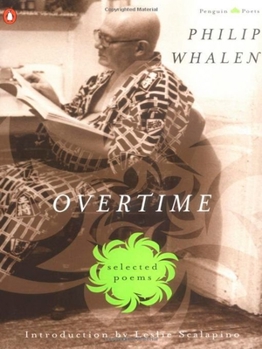Overtime: Selected Poems
Like his college roommate Gary Snyder, Philip Whalen took both poetry and Zen seriously. He became friends with Allen Ginsberg, Jack Kerouac, and Michael McClure, and played a key role in the explosive poetic revolution of the '50s and '60s. Celebrated for his wisdom and good humor, Whalen transformed the poem for a generation. His writing, taken as a whole, forms a monumental stream of consciousness (or, as Whalen calls it, "continuous nerve movie") of a wild, deeply read, and fiercely independent American--one who refuses to belong, who celebrates and glorifies the small beauties to be found everywhere he looks. This long-awaited Selected Poems is a welcome opportunity to hear his influential voice again.
Format:Paperback
Language:English
ISBN:014058918X
ISBN13:9780140589184
Release Date:May 1999
Publisher:Penguin Publishing Group
Length:336 Pages
Weight:1.00 lbs.
Dimensions:0.9" x 5.9" x 8.9"
Age Range:18 years and up
Grade Range:Postsecondary and higher
Customer Reviews
5 ratings
Big Zen Ha Ha (from Ahadada Books)
Published by Thriftbooks.com User , 16 years ago
If, as Leslie Scalapino suggests in the introduction to this book, Philip Whalen's poetry is about how his consciousness worked and utilized language, so that each poem is a gestalt of his thinking in process, then I think we must add that Big ZEN HA HA is present, ever-present in the articulate artifacts this poet of the hole-in-the-shoe and the shaven head (and I hear sadly mortal heart gunked up and out of incarnation by casual eating habits) left behind. Every turn of a trope ends in an undercutting of intention and meaning in the same way that the polyvalency of BIG ZEN HA HA (think "koans" here), undermines single meaning in every sacral utterance of Zen scripture. Of the See No Evil, Speak No Evil, Hear No Evil, Big Three of Gary Snyder, Philip Whalen and Lew Welch, we pretty much understand the hooks on which Snyder and Welch hung their tambourines, but it's Whalen who seems the reticent, self-effacing, hard to clearly define (just as Zen is), guy. He comes across sometimes as a New York School Poet (though lacking the sophistication of an Ashbery or O'Hara but including all their allusions to pop culture), and sometimes as a collagist of texts, in a kind of casual West Coast surrealism, but always as a 5-to-75 cent word nihilist, ready with a stick of BIG ZEN HA HA to shatter the prisms he stacks up so carefully before phenomena to liberate the pure light of the momentary mind. (And sometimes his verbal gestures remind me of the outsider texts, as well as the outsider stance of Harry Partch.) I'm still reading Whalen's Overtime news, hoping to stick around long enough to hear him whine for a toy early in his next incarnation on the streets of Tomorrow.
The Brainy Beat
Published by Thriftbooks.com User , 22 years ago
I didn't know much about Whalen's poetry until he died this year, but the terrific memorial reading for him here in San Francisco drove me to "Overtime" and man, what a find. The Beats were more learned than the 'first thought, best thought' aesthetic suggests, and Whalen's poems balance religion, philosophy and cranky Zen insight with a casual, conversational Americanese in a way few of his more famous contemporaries could touch. His poems draw from a deep past that embraces everything from ancient Chinese verse to classical music, but insist that it walk down the street in T-shirt and jeans. Whalen spent the last three decades of his life at the San Francisco Zen Center--his particular brand of Buddhism, so generous to human failings (starting always, comically, with his own) and never, ever doctrinaire, has to be one of the most attractive spins on Eastern religion I've read. Whalen was in it and of it, never above it. He gives the moment plenty of wiggle room in his writing, so that cats, friends and silly thoughts can all stray into the poems without being shoo'd out for art. Whatever Beat meant, Whalen shows it in about its best light. Poetry's a little thinner and more straight-laced with him gone.
Run to your nearest bookseller and demand this book!
Published by Thriftbooks.com User , 25 years ago
Philip Whalen is a national treasure, one of our most important living poets. This collection, masterfully assembled by Michael Rothenberg, is a great place to start if you're not familiar with Whalen's work, and a glorious visiting ground for those of us who have already discovered him. Don't let the word POETRY dissuade you. You will not be bored for a minute.
Ron Padgett says about Overtime
Published by Thriftbooks.com User , 25 years ago
"In Philip Whalen's poetry, offhand compositional elegance and the deep amusement of wisdom combine to produce one of the pure delights of contemporary literature."
Alice Notley says about Overtime
Published by Thriftbooks.com User , 25 years ago
"Philip Whalen is a great poet; I get as much wisdom and affection from his word as from that of any poet whosoever, dead or alive, having lived whenever. The range, the space, the humor are all considerable, kingdoms of cloud mind unscrolling into the most concrete of details. This is a very large spirit."





